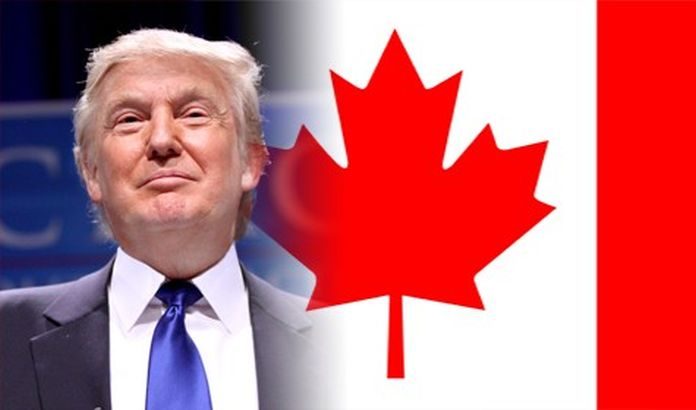President Trump Joins U.S. Dairy Sector, Members of Congress in Criticizing Canada’s Damaging New Pricing Scheme
May 8, 2017
 National Milk’s efforts to reverse Canada’s damaging dairy trade policy changes made international news last month when President Donald Trump spoke publicly about how Canada’s trade violations are “a disgrace,” and harm U.S. dairy producers. Farmers and dairy company leaders reinforced this message during high-level meetings with administration officials and Congress members at the beginning of May.
National Milk’s efforts to reverse Canada’s damaging dairy trade policy changes made international news last month when President Donald Trump spoke publicly about how Canada’s trade violations are “a disgrace,” and harm U.S. dairy producers. Farmers and dairy company leaders reinforced this message during high-level meetings with administration officials and Congress members at the beginning of May.
NMPF has been warning since mid-2016 that Canada’s new Class 7 pricing scheme, piloted last year in Ontario as Class 6 and now being used in numerous provinces, gives unfair advantage to domestic milk ingredients in an industry that already benefits tremendously from Canada’s high-cost supply management dairy structure. This new policy has pulled the rug out from under U.S. exports of U.S. ultrafiltered milk, while at the same time undercutting U.S. exports to other global markets.
This national ingredients strategy “has resulted in lost markets for companies in Wisconsin and New York, threatening the livelihoods of numerous dairy farm families,” said Jim Mulhern, president and CEO of NMPF.
Even more worrisome, he said, is that the policy “also enables Canada to dump excess dairy proteins onto world markets, posing a larger and longer-term threat to U.S. dairy farmers relying on overseas milk powder sales.” Reports have already surfaced of Canadian milk powder being offered on global markets at fire sale prices – a new development since the introduction of Class 7.
During a fly-in rally organized NMPF and the U.S. Dairy Export Council (USDEC), more than 30 farmers and dairy company executives fanned out on Capitol Hill to emphasize that trade opportunities both north and south of the U.S. are crucial to America’s dairy sector. The dairy coalition also met with Agriculture Secretary Sonny Perdue, Acting U.S. Trade Representative Stephen Vaughn and White House agriculture advisor Ray Starling (second photo: producers with House Speaker Paul Ryan).
NMPF and other U.S. dairy groups have repeatedly raised concerns about Canada’s efforts to undercut competition from the United States. NMPF has worked to bring this issue to the attention of Trump Administration officials, members of Congress and dozens of governors, most recently in an April 13 letter asking Trump to urge Canadian Prime Minister Justin Trudeau to halt the new pricing policy and restore the flow of U.S. ultrafiltered milk.
These engagement efforts bore fruit in mid-April when, during a speech in Wisconsin, Trump reprimanded Canada for its pricing scheme, calling the resulting impact on U.S. farmers “unfair,” followed by a tweet reiterating this point. Other political leaders, including House Speaker Paul Ryan and Senate Minority Leader Chuck Schumer, have also pressed Canada on the negative impacts of its approach to dairy trade. Both congressional leaders have written to the administration on this issue in the past month.
Other members also chimed in to create a swelling chorus of concern about Canada’s actions. Most recently, a bipartisan group of 68 House members sent a letter in late April to the White House, asking Trump to insist Canada comply with its trade obligations. NMPF worked closely with the offices that led this letter: Reps. Collins, DelBene, Stefanik, Kind, Duffy and Welch.
“Canada has repeatedly sought ways to evade its trade commitments and erode U.S. export gains, both within Canada and around the world,” Mulhern said. “We are pleased to see our efforts to insist that Canada play by the rules are building a broad base of bipartisan awareness about the urgent need to take action on this issue.”
Even as Canada and the future of the North American Free Trade Agreement (NAFTA) have dominated headlines, NMPF has been vocal about the need to preserve the agreement in light of the stable and reliable partnership with Mexico, U.S. dairy’s No. 1 export market. The United States sold $1.2 billion worth of dairy products last year to customers in Mexico, amounting to roughly one-fourth of total U.S. exports. Those exports create tens of thousands of U.S. jobs and $3.6 billion in U.S. economic impact.
Mulhern said “NMPF will continue to insist that any renegotiation of NAFTA maintain this vital export market, and preserve the strong working relationship with customers and counterparts in Mexico.”






